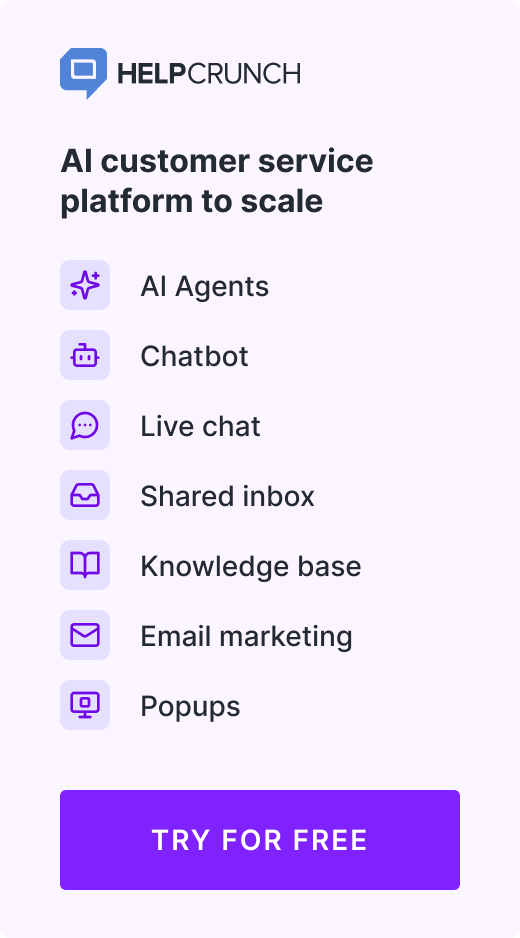Intercom vs Zendesk: Full 2026 Comparison of Features & Pricing
Detailed features and prices comparison of support platforms Intercom and Zendesk. Which will take the lead?
Written by Kateryna Havrylenko

Choosing between Zendesk and Intercom sometimes feels like picking between Apple and Samsung. Both are strong options, but each comes with its own surprises that only show up after a month of real use. Zendesk is the foundation for teams that need a robust system, while Intercom is a good choice for those who want to add proactive support to their product.
To save you from investing your annual budget in the wrong platform, we conducted our own research. Instead of relying on Google comparisons, we signed up for the trials, rolled up our sleeves, and tested their ability to deal with real customer chaos. So, Intercom vs Zendesk for small businesses or enterprise giants?
TL;DR
Pick Zendesk if you’re handling thousands of inquiries and need a true powerhouse for processing customer data. If your priority is conversational support, and you’re comfortable letting an AI agent take care of most customer questions, go with Intercom.
Or you can take the smart route: HelpCrunch blends the best of both at a price that feels like a reasonable investment, not a mortgage. It combines live chat, AI agents, a chatbot to assist you and collect qualified leads, a knowledge base, omnichannel communication, automation, etc. Sign up for a free trial and test it yourself.
Intercom vs Zendesk: Platform general overview
I will skip the long intros about the background of software and get straight to the point. Let’s look at this quick comparison table to see the basic differences.🧐
| Zendesk | Intercom | |
|---|---|---|
| Free trial and plan | 14-day free trial; no free plan | 14-day free trial; no free plan |
| Starting price | from $25/agent per month | from $39/seat per month |
| Pricing basis | number of agents | number of agents + features usage |
| Ticketing | robust, but clunky and overwhelming for small teams | conversation-based, lacks a deep ticket hierarchy |
| AI capabilities | Zendesk AI is for automation and macro suggestions | Fin AI Agent is more native and better for proactive support |
| Live chat | outdated user interface, but it has all the necessary features | modern, customizable chat interface, it has all the necessary features |
| Knowledge base | feature-rich help center, but the editor and UI feel outdated | integrated with a Fin AI Agent for instant answers, but limited template and styling options |
| Integrations | 1500+ apps, including Zapier, Slack, and WhatsApp | 400+ apps (focus on SaaS, marketing, and product tools) |
| Setup and complexity | high, requires a dedicated admin to build workflows | medium, automation setup can get messy |
| Best suited for | mid-size and large businesses, enterprise customers | large businesses, enterprises |
| Capterra reviews | 4.4 / 5 ⭐⭐⭐⭐ | 4.5 / 5 ⭐⭐⭐⭐ |
| G2 reviews | 4.3 / 5 ⭐⭐⭐⭐ | 4.5 / 5 ⭐⭐⭐⭐ |
Helpdesk features
For a lot of businesses, Zendesk is basically the ultimate command center. Yeah, its ticketing setup can be overwhelming, but most see it as the main Intercom alternative. The helpdesk lets you see everything: from which agent is stuck on a ticket to complex internal threads.
Moreover, Nucleus Research found that companies switching from Intercom to Zendesk cut first response times by 61% and problem resolution by 54%. That’s all, thanks to a structured system that saves you from manually monitoring queues.
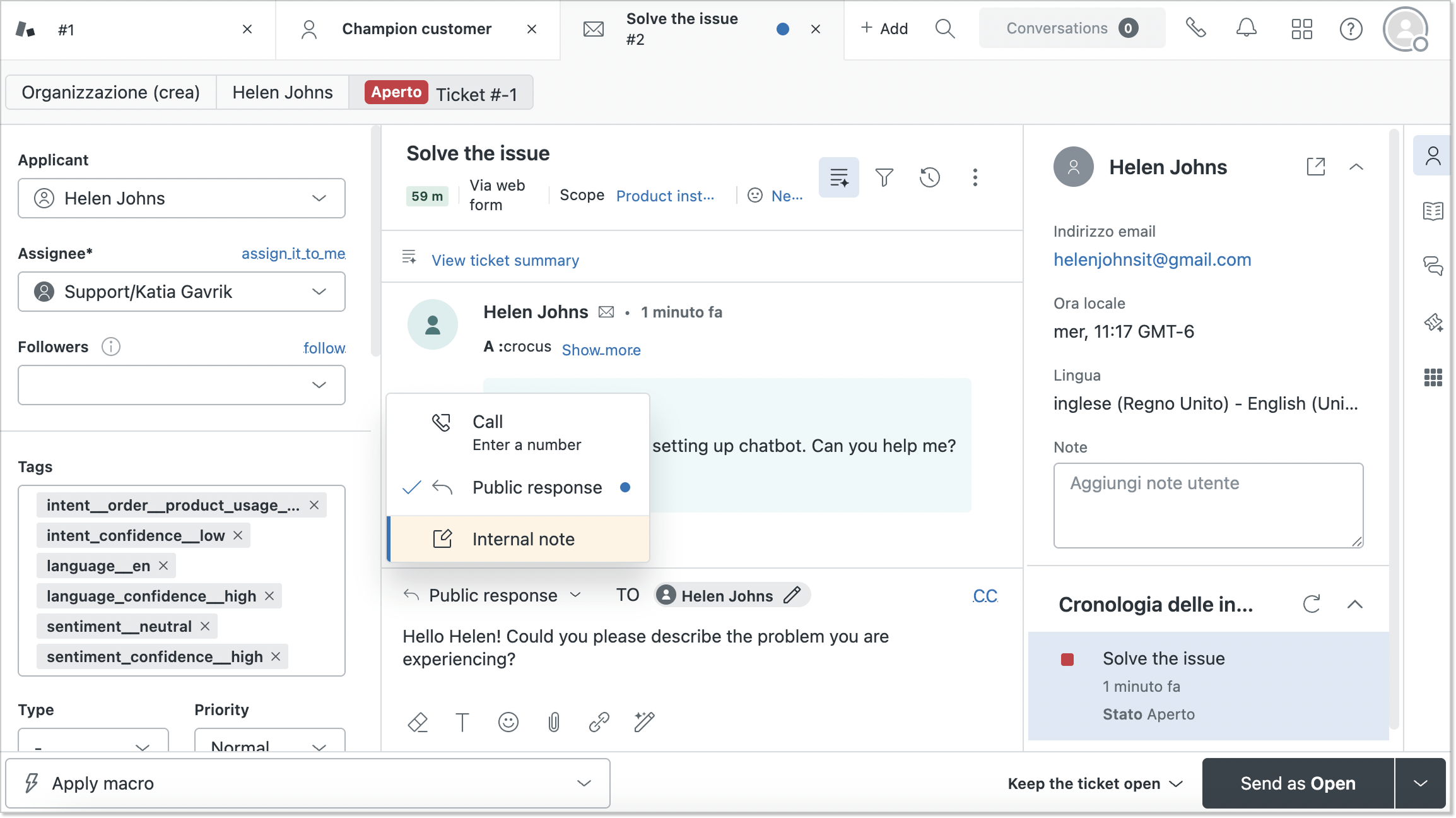
P.S. If you spot a mix of English and Italian on the screen, don’t worry, it’s not your eyesight. Zendesk is known for its complexity, so even basic things like changing the language can take more time and patience than you’d expect (and sometimes still don’t work as planned 😅).
Intercom in 2026 remains a strong contender. Its updated helpdesk isn’t just a chat anymore, but a solid platform with deep customer context available directly to agents. Still, the mindset hasn’t changed: Intercom is built around conversational support, keeping things user-first. Once you’re dealing with hundreds of customer inquiries per day and large teams, that flexibility can feel too loose compared to Zendesk’s multi-layered workflows. For those looking for a balanced approach, choosing HelpCrunch vs Zendesk would be a wiser move.
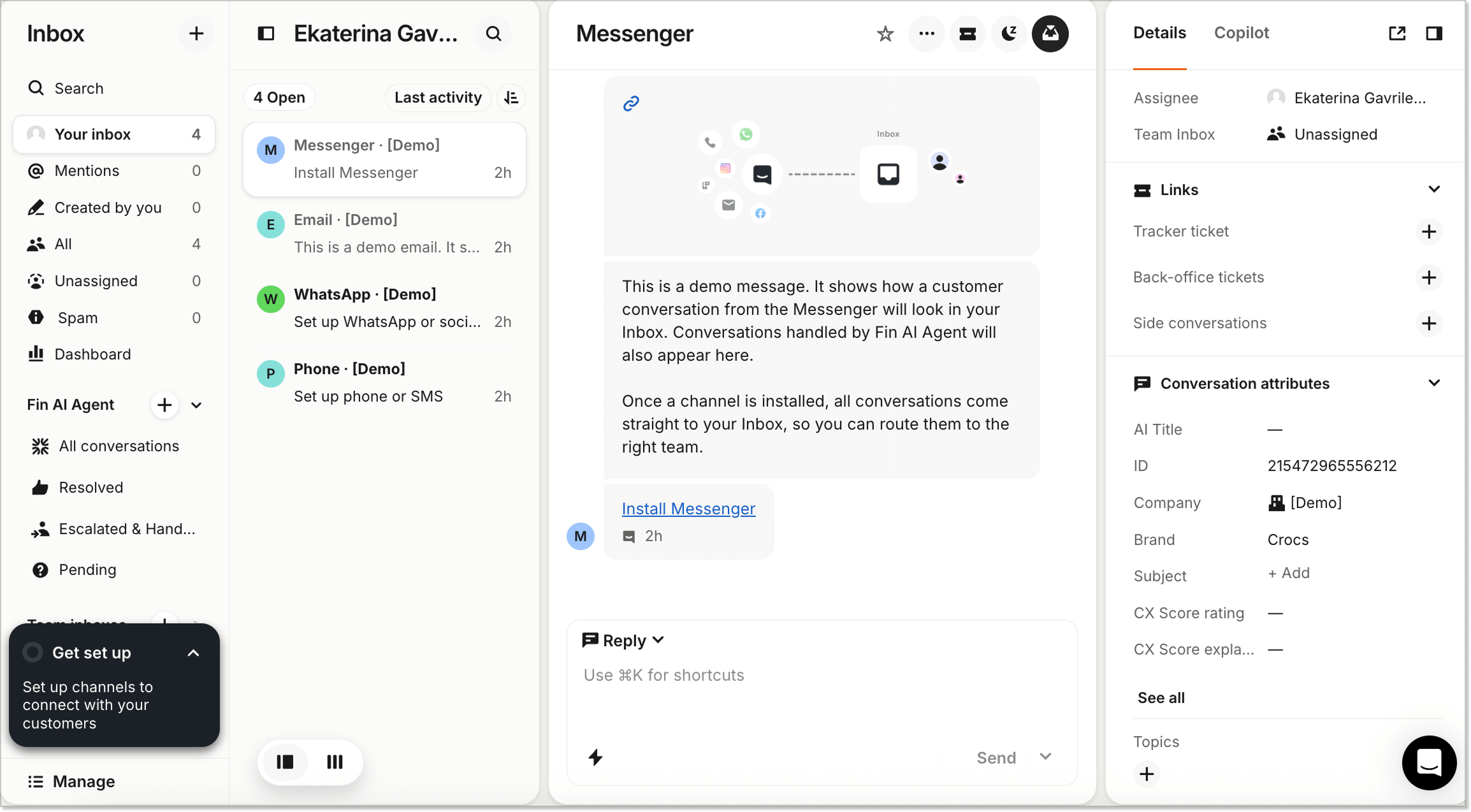
Ticketing
In Zendesk, ticketing is basically an army. Every request gets a number, a strict status, and follows hard rules. Automation is its core strength: hundreds of triggers and macros can be configured, so the system automatically decides how each request is handled.
Intercom now offers a fully-fledged ticketing system, and as of 2026, they’ve introduced robust tools like Tracker (for monitoring recurring issues) and Back-office tickets (for handling internal tasks). However, it still feels significantly lighter than its competitors because Intercom excels at hiding technical “bureaucracy” behind a seamless conversational interface. While Zendesk immediately hits you with a barrage of mandatory fields and complex configurations, Intercom keeps the focus where it belongs: on the message content and the customer’s context.
Intercom Fin vs. Zendesk AI
The battle between Intercom Fin and Zendesk AI is essentially a clash of “smart minimalism” versus “corporate power.” Both platforms have long evolved from simple chatbots to fully-fledged AI agents, but their approaches are completely different.
The Fin AI Agent in 2026 has become the standard for teams that don’t want to spend months on setup. Its main strength is conversational AI, which truly understands context rather than just searching for keywords.
- Why it’s great: Fin hardly ever hallucinates. If it doesn’t know something, it politely hands the conversation over to a human. In 2026, Intercom added “Procedures,” allowing AI to perform actions in other services (for example, issue a refund or change a subscription) without agent intervention.
- Drawbacks: the main issue is the cost of autonomy. You pay for every successful resolution. Sometimes Fin “resolves” an issue that isn’t really solved (the customer just leaves), and you still pay.
Zendesk isn’t here to play nice. It’s a full-blown ticketing tank.
- Why it’s great: Agent Copilot helps agents like a pro. It proposes replies, summarizes long threads, and even does live sentiment analysis to flag potential blow-ups. Its AI triage (automatic ticket sorting) is rock solid.
- Drawbacks: Zendesk is still clunky. There’s a ton of settings to navigate, and to make AI really sing, you basically need an admin on staff. Even in 2026, new AI features sometimes clash with old macros, creating messy responses.
Live chat features
Here, the picture is reversed: Intercom clearly outperforms Zendesk. Its messenger really shines. It’s proactive, stylish, and feels like a native part of your product rather than a sticker slapped onto the website. You can customize it to match any brand, and the widget can display updates or guide users through onboarding.
Beyond aesthetics, Intercom offers advanced AI writing tools directly in the chat, allowing agents to translate messages instantly, adjust the tone of voice, and fix grammar or spelling errors. Features like AI Compose and Copilot suggestions help summarize long conversations and provide smart action prompts, making the workflow highly interactive and efficient.
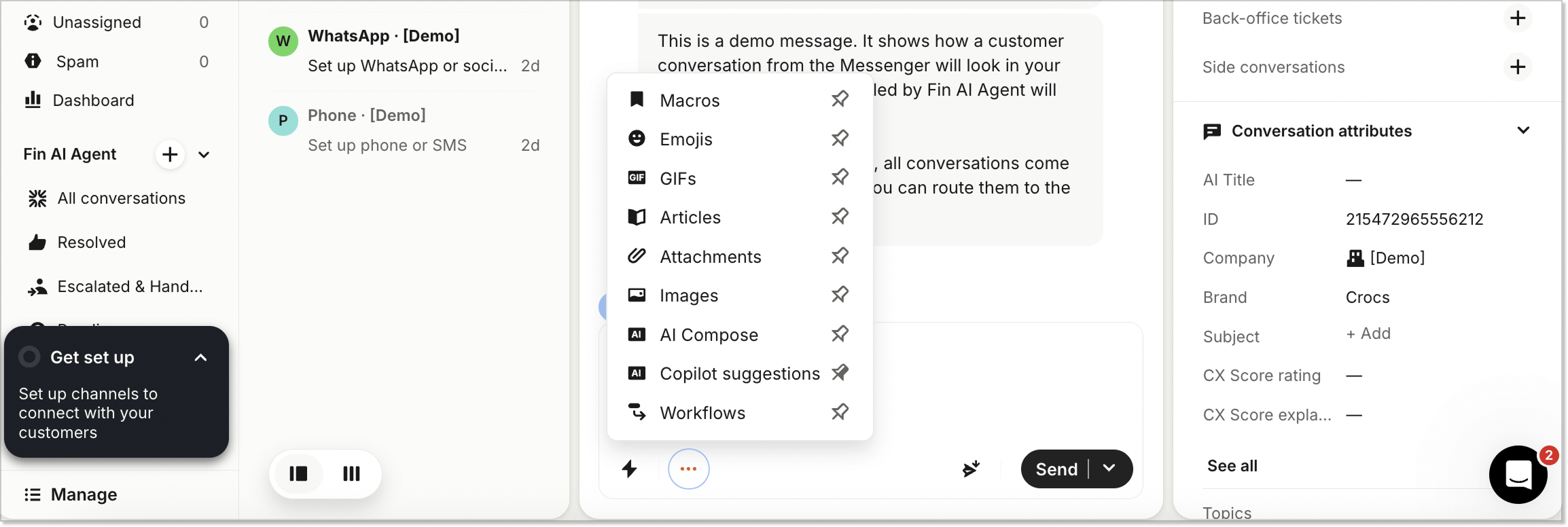
In the Zendesk vs Intercom comparison, Zendesk feels more like a traditional administrative tool. Regarding AI capabilities, Zendesk focuses on basic text adjustments, allowing you to expand, simplify, or shift the tone of a reply, but it lacks the deep, interactive feel of its competitor. The interface is limited to standard actions like attaching files, adding links, and basic Markdown formatting (bold/italic). It serves as a reliable ticketing machine, but it doesn’t offer the same level of creative or automated engagement found in Intercom.
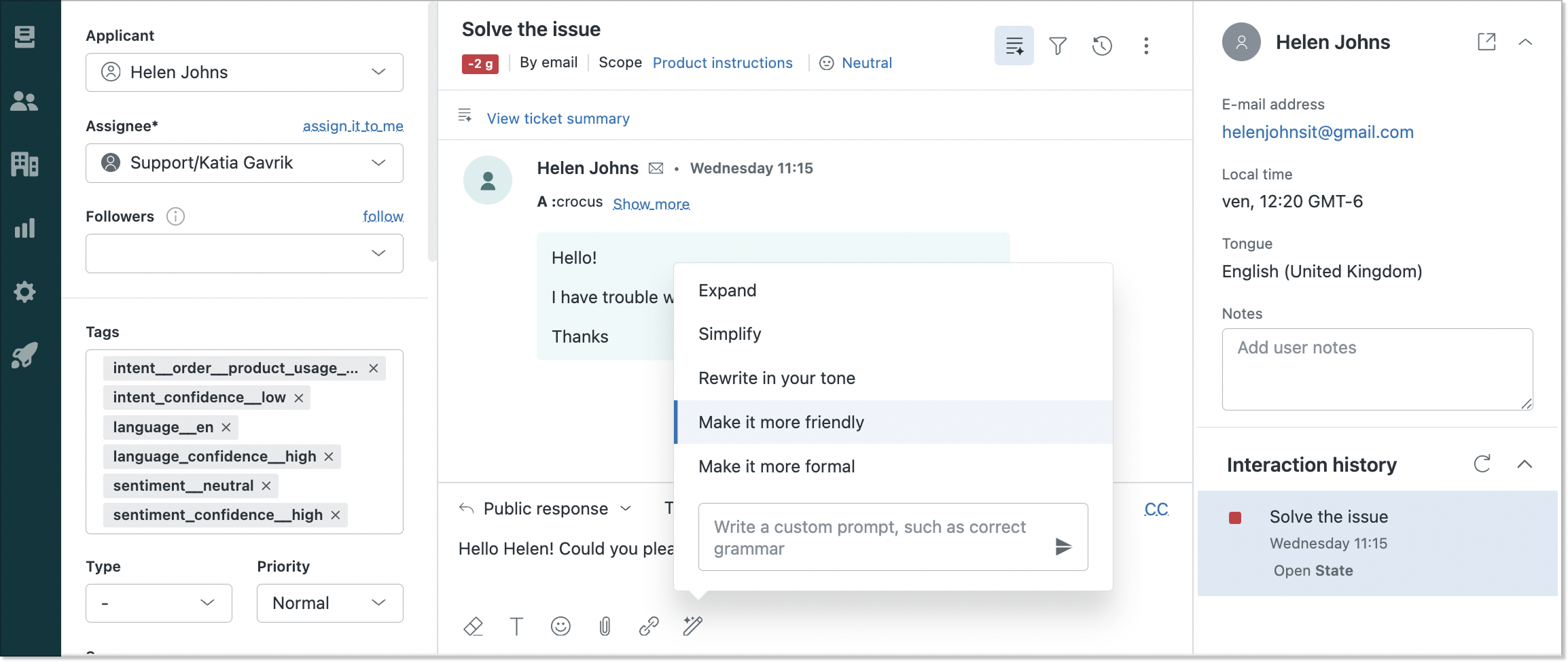
Knowledge base features
Both platforms offer strong self-service solutions, just with very different vibes. Zendesk Guide is a full-scale library. You can create dozens of articles in a simple, WYSIWYG text editor, divide them by categories and sections, and customize them with your custom themes. It’s a true help center with strong SEO potential and multilingual support.
Intercom leans hard into integration. The knowledge base is baked straight into the chat widget, so users can pull up articles without leaving the conversation. That alone boosts support performance. The downside? Design customization is pretty limited – you either like the Intercom’s style or adapt to it.
Reporting and analytics
If you’re a fan of numbers, Zendesk is your paradise. Its dashboards let you extract virtually any data: first response time, individual agent performance, and channel load. You can build reports based on almost any parameter imaginable.
Intercom’s analytics are visually appealing but relatively shallow. You’ll see high-level trends, but once you want to dig deeper (for example, comparing complex KPIs across teams), the tooling may fall short. It’s more about monitoring than deep business analytics.
Integrations
Zendesk has over 1500 apps in its marketplace. It’s a true omnichannel hub: you can connect WhatsApp, Slack, Shopify, Zapier, or even very niche CRMs. Most integrations are deep and well-developed.
Intercom has a more modest selection of around 450 integrations, but they are strongly focused on marketing, product, and fast sales. While both platforms work perfectly with Zapier, Intercom is better at delivering real-time user data, which is especially useful for personalized messaging.
Interestingly, despite being competitors, Zendesk and Intercom offer official integrations with each other. For example, you can install the Zendesk app directly inside the Intercom Inbox to view a customer’s ticket history without leaving the chat. Alternatively, you can sync your Zendesk knowledge base to power your Intercom bot.
Intercom vs Zendesk CRM features
Here, Intercom takes the lead once again. Because it tracks on-site customer behavior, the platform becomes a powerful tool for customer relationships. It’s almost a CRM, allowing you to run email marketing campaigns, send push notifications, and capture leads directly in the chat.
Zendesk approaches this differently with Zendesk Sell. It’s a standalone, fully-fledged CRM platform. While it’s far more powerful than Intercom’s tool when it comes to managing sales pipelines, it also lives in a separate browser tab. Intercom is an all-in-one experience, while Zendesk relies on professional tools that work together as a connected stack.
Zendesk vs Intercom comparison of customer support
You know, there’s a certain irony here: companies sell customer support software, but once you’re their customer, the illusion cracks pretty fast. I went down the rabbit hole of real reviews on G2 and Capterra, tested their support myself, and here’s the honest verdict on Intercom versus Zendesk.
Zendesk’s customer support
Zendesk technically checks all the boxes (phone, email, chat). Sounds good, right? But here’s the plot twist: their own stats show an average first response time of 24 hours. And yeah, even they seem low-key embarrassed by that.
One of Zendesk’s customer reports:
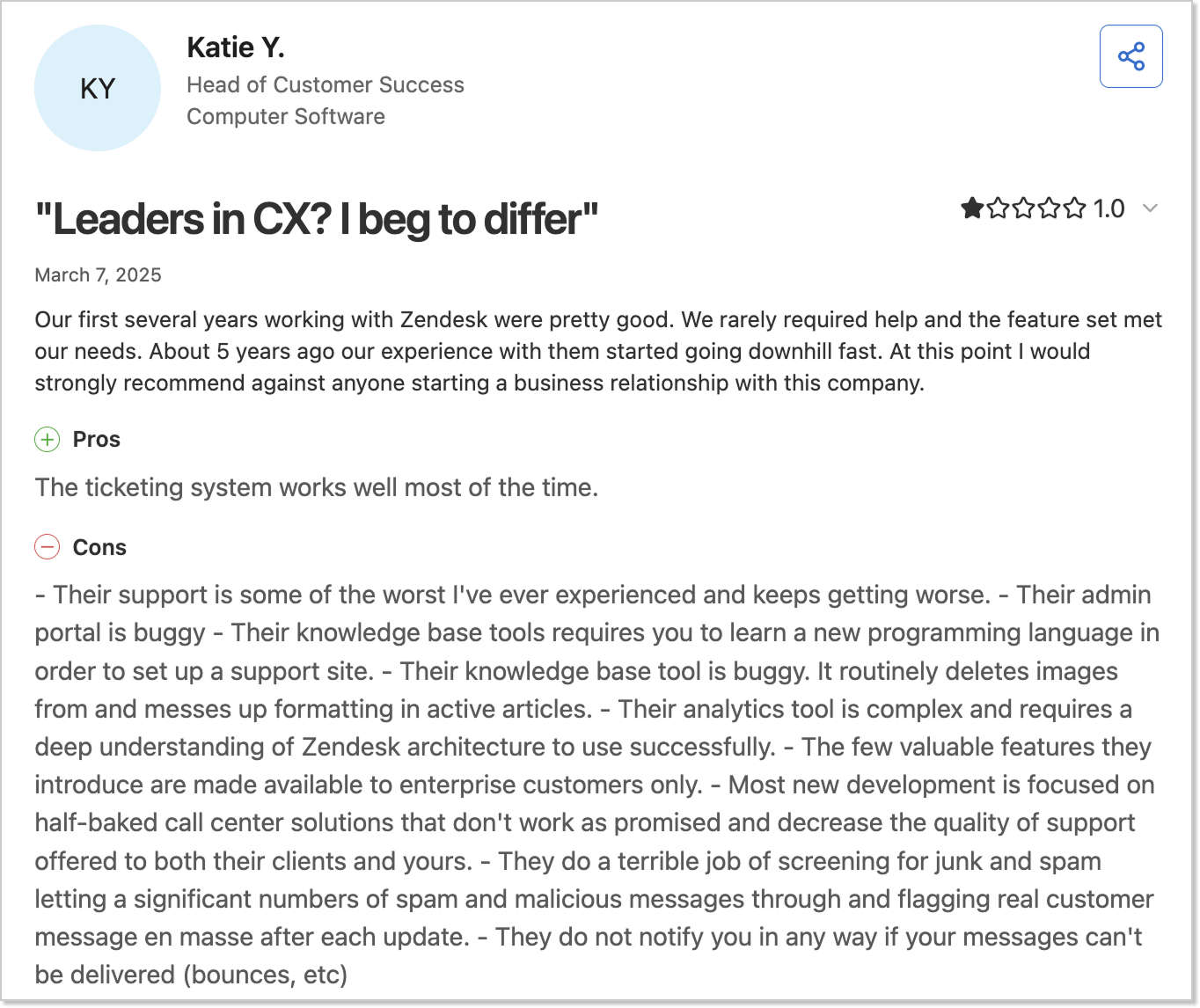
I also tried to deal with their AI agent Zea and the support team to solve a basic question. And guess what? The bot kept looping me back to square one: “Hi! How can I help you?” Reaching a human agent took me dozens of steps. Zendesk has all the channels, but speed and quality are another story. On cheaper plans, you just wait. And Zea? More broken record than an AI assistant.
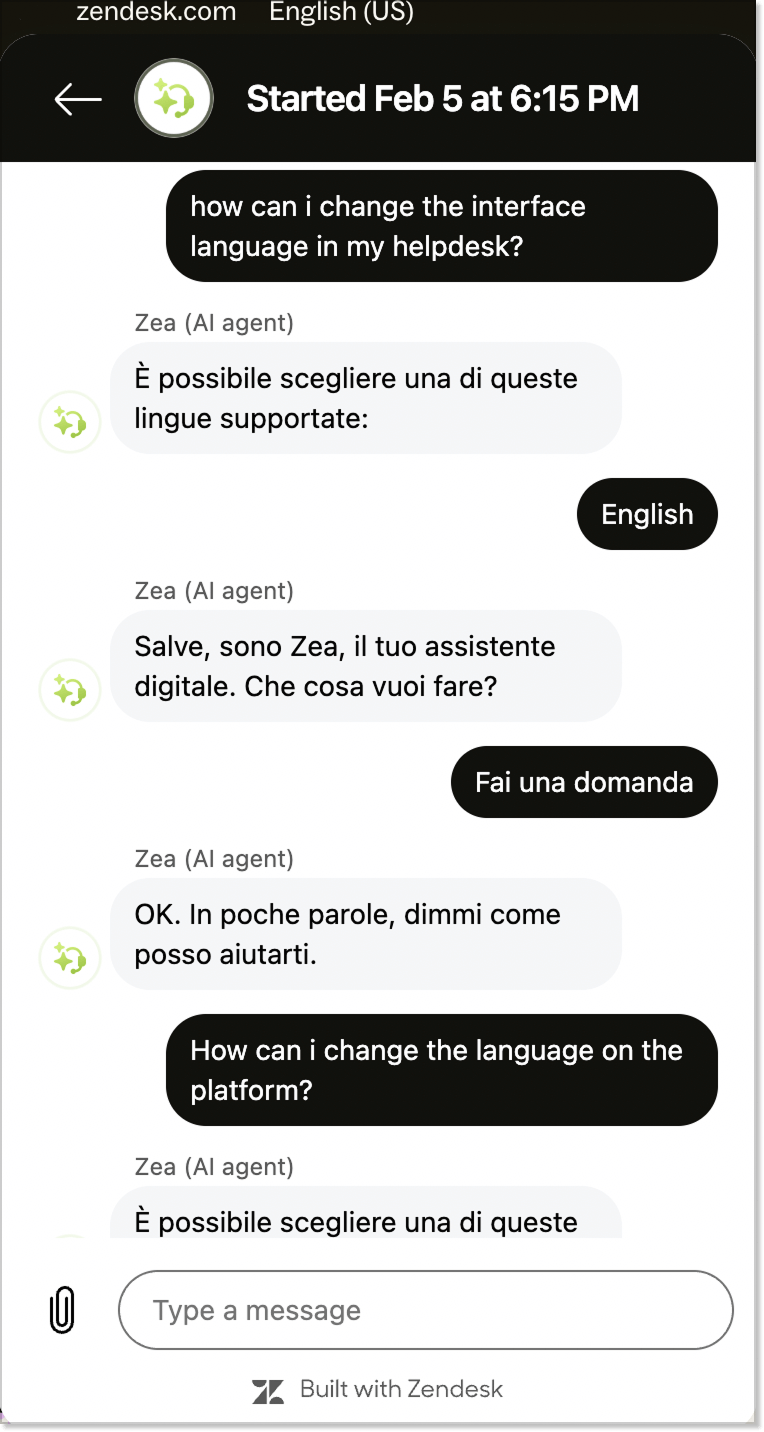
Intercom’s customer support
Intercom went all-in on their Fin AI agent. The problem? When Fin can’t help, reaching a real human feels like unlocking a hidden boss level.
Here’s what one frustrated customer wrote on Capterra:
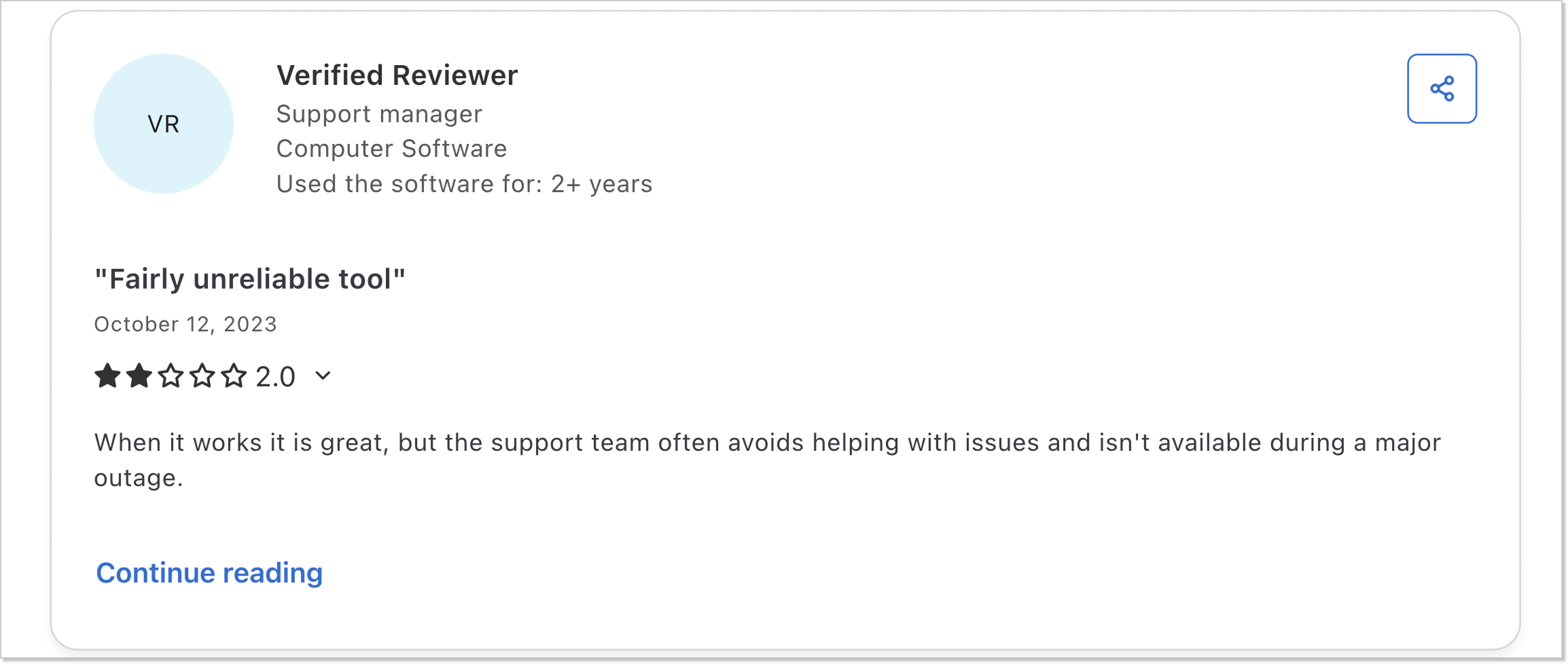
Intercom vs Zendesk: pricing
If you want to test Intercom or Zendesk before deciding on a tool for good, they both provide free 14-day trials. But sooner or later, you’ll have to decide on the subscription plan, and here’s what you’ll have to pay.
Zendesk pricing
Zendesk pricing can seem complex at first, but the model itself is fairly logical. You purchase an all-inclusive package, and as the level of control and automation increases, so does the cost per agent seat. Zendesk offers two main product lines: Suite (all in one) and Support (ticketing only). Let’s have a quick look at the price for each plan.
- Support Team ($25/agent/month): this is the starter kit for teams that just need to manage emails. You get a basic ticketing system, a simple knowledge base, and very limited live chat.
- Suite Team ($69/agent/month): this is where true omnichannel service begins. Email, chat, social media, and phone support are all in one place. You also get basic AI automation for auto-replies and a public help center.
- Suite Professional ($149/agent/month): the Pro level. This tier finally unlocks advanced analytics, so you can actually track performance.
- Suite Enterprise ($219/agent/month): it offers custom agent roles, “sandboxes” for testing your setup without breaking things in real-time, and high-level security controls.
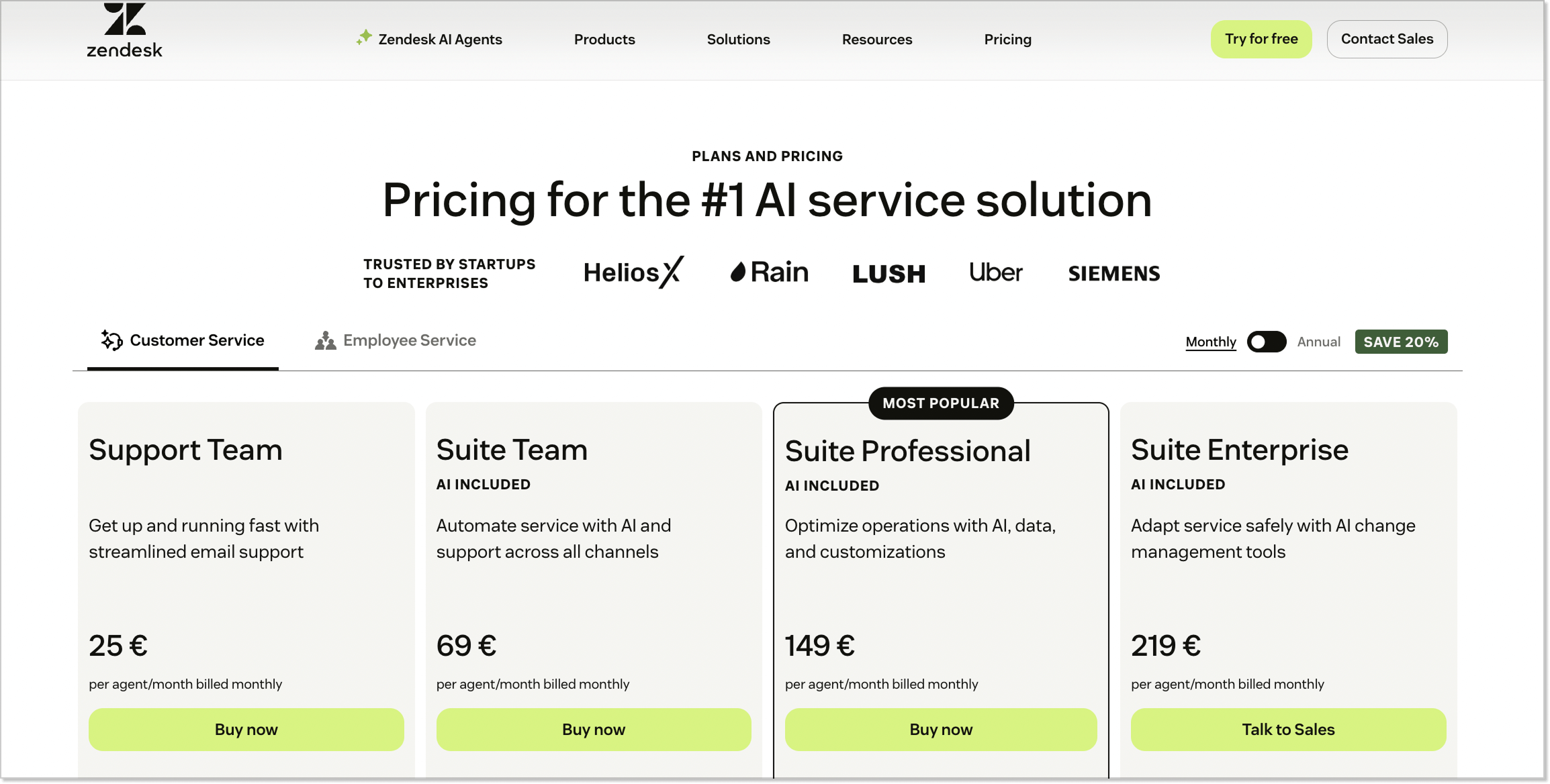
Also, keep in mind that the selected plan is only the starting line. In practice, most companies eventually need paid add-ons to properly fine-tune the system for their real needs. So be prepared for these upgrades to noticeably increase your final bill after the subscription is already in place.
Intercom pricing
If you thought Zendesk prices were confusing, let me introduce you to the Intercom prices. At first glance, they seem like simple three packages for small, medium, and big businesses. But it’s virtually impossible to predict what you’ll pay for Intercom at the end of the day. They charge not only for customer service representative seats but also for feature usage and offer tons of features as custom add-ons at additional cost.
Base plans (monthly billing):
- Essential ($39 per seat): entry-level functionality for startups (chat, email, shared inbox);
- Advanced ($99 per seat): enhanced workflow automation and deeper integrations;
- Expert ($139 per seat): advanced control, security, and analytics for large teams.
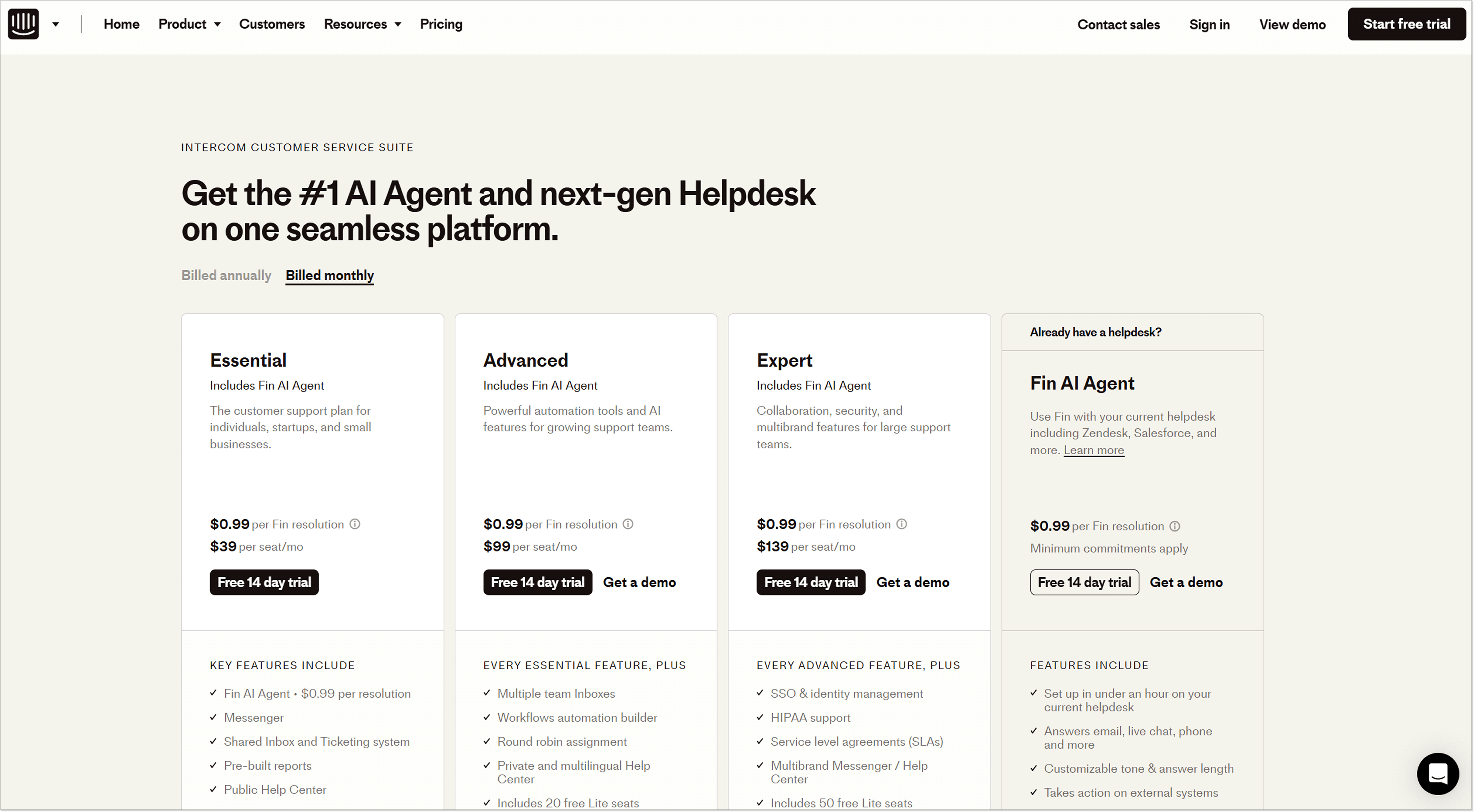
The key feature (and the main headache) is Intercom’s strong push for its AI agent, Fin. As I mentioned earlier, for each successful AI resolution you pay $0.99. Basically, it’s just a dollar, but with 1000 requests per month, your bill automatically grows by $990, on top of license costs.
And again, don’t forget about add-ons. Advanced support or extra customer engagement tools can easily add $99/month or more.
Why HelpCrunch is the future of customer service
When looking at who are Intercom competitors, HelpCrunch stands out as a balanced alternative. If Zendesk represents the past with its heavy structure, and Intercom stands for an expensive present full of hidden fees, then HelpCrunch confidently positions itself as the future of customer support. Here’s why:
1. Transparent pricing with no surprises
While competitors keep finding new ways to charge you an extra dollar per interaction, HelpCrunch sticks to clarity. No dollars per conversation, we let you use automation to its potential without counting every message. Furthermore, you don’t have to pay extra for software features that should be included by default.
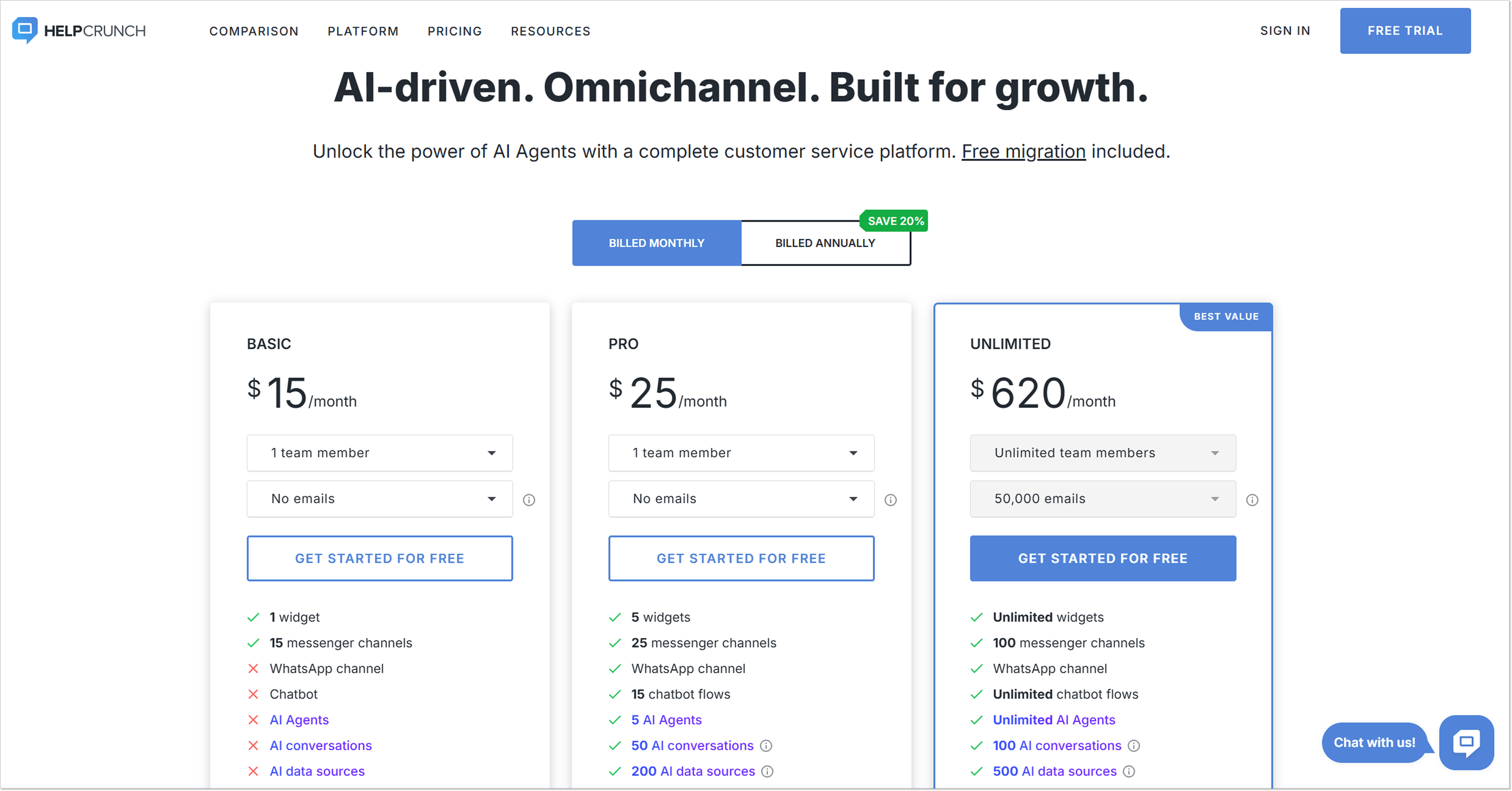
2. The AI agent is smart, not more expensive
HelpCrunch AI agents handle up to 80% of incoming requests using your knowledge base, maintaining context-aware conversations rather than simple keyword matching. Straightforward issues are resolved automatically, while complex cases are transferred to human agents.
Built-in AI tools further support agents by improving tone, correcting errors, translating responses instantly, and helping teams maintain speed without compromising quality.
3. Simplified ticketing and service management
While Zendesk is often criticized for being too complex, HelpCrunch offers robust ticketing capabilities without the steep learning curve. The system automatically converts emails and complex chat queries into organized tickets, allowing your team to assign owners, set priorities, and track statuses in a clean, unified interface. This streamlined service approach ensures that high-priority issues never get lost in a busy chat queue, providing the structured workflow of a classic helpdesk combined with the speed of a modern messenger.
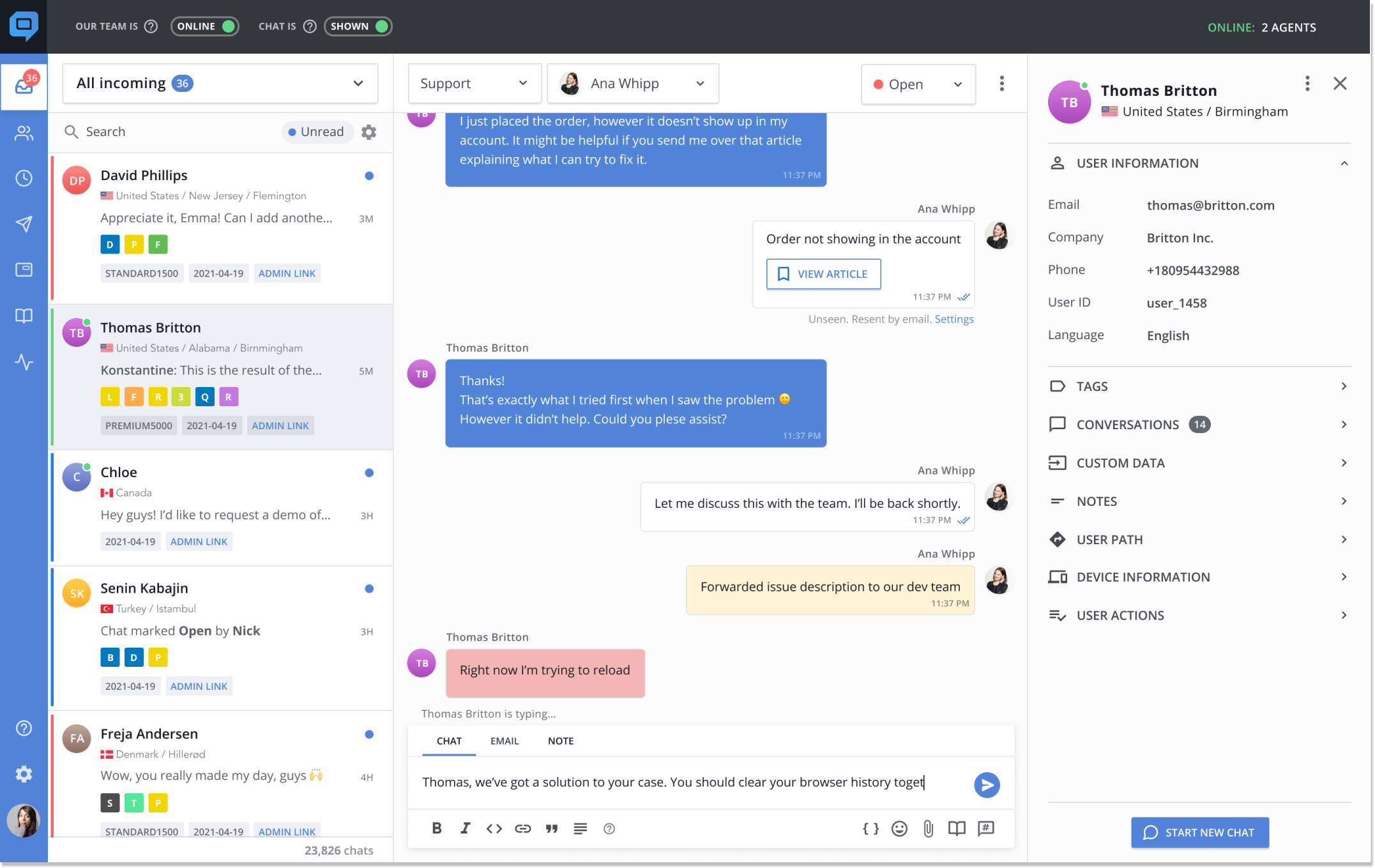
4. Extensive functionality at a fair price
There’s a myth that premium functionality comes only with Zendesk or Intercom. In reality, HelpCrunch offers the same level of power at a far more reasonable price. Everything you need lives in one interface:
✔️ AI agents and automation;
✔️ Live chat (full widget customization, real-time typing previews, proactive greetings, chat ratings);
✔️ Omnichannel shared inbox (collect email, website chat, WhatsApp, Messenger, Instagram, Viber, and Telegram messages into a single queue);
✔️ Marketing and sales tools (email campaigns, popups, and lead capture);
✔️ Knowledge base and self-service (fully customizable help centers with faster setup).
So why pay for a corporate name when you can get the same AI agents, live chat, and analytics with HelpCrunch, and still keep budget room to grow your own product? When choosing between HelpCrunch or Intercom, remember that you are also choosing a support partner that truly has your back.
Our users highlight that our team is “truly professional and responsive,” providing real human help without relying on robotic, canned responses. Many companies that migrated from Intercom noticed that our support team is always there to assist with even the most non-standard problems.
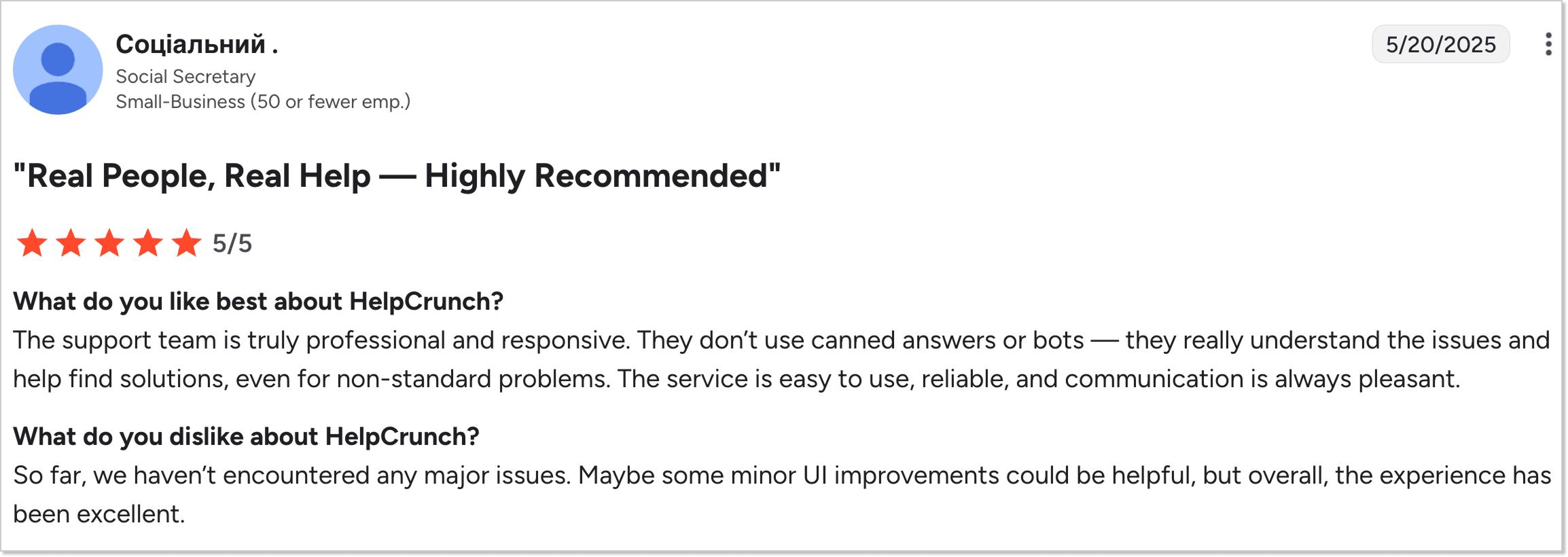
Test any of HelpCrunch’s pricing plans for free for 14 days and see our service tools in action immediately.
Conclusion
So it makes sense to ask you: which platform do you consider the winner of this battle? The decision between Zendesk vs Intercom functionality essentially depends on the level of budget and process control you prefer. If you are more into the classic approach, Zendesk remains a viable choice. Intercom is better suited for teams that prioritize advanced automation and innovation.
Zendesk offers a robust ticketing service that grows with you without unexpected spikes in cost. Its unified agent workspace allows your team to manage data across multiple channels efficiently, ensuring that no customer support request falls through the cracks.
On the other hand, Intercom excels as a software primarily built around the messenger experience, focusing on proactive engagement. With extensive capabilities for in-app messaging and over 300 native apps, it’s designed for a modern service experience. If you need to connect your stack, both tools integrate with Zapier, but Intercom’s focus is on real-time customer support interactions rather than traditional long-form tickets.
In the end, there’s no perfect tool for everyone. Each platform has its strengths, the trick is to know which compromises you are okay with. The most important thing is that your chosen support solutions help you build relationships with customers, not add more work for your team.
FAQs
What are the differences between Intercom and Zendesk?
Zendesk is a powerful ticketing system. It’s ideal for strict organization, detailed reporting via dashboards, and managing multiple service channels simultaneously. Intercom is a modern platform built for real-time communication. It focuses on live chat, AI-driven automation, and robust in-app sales conversations.
Is Intercom a replacement for Zendesk?
Yes, Intercom can be a perfect Zendesk alternative for those seeking modern customer support. However, when comparing Zendesk vs Intercom for customer support, the latter is more CRM-oriented. While Zendesk focuses on complex issues, Intercom excels in capabilities related to user engagement and lifecycle marketing.
Which is cheaper, Intercom or Zendesk?
Zendesk is cheaper and more predictable for budgeting. You pay a fixed fee per agent, and your costs don’t change based on the number of customers or messages. Intercom is more expensive due to hidden costs. As your business scales, Intercom’s total cost grows much faster than Zendesk’s.
How does HelpCrunch compare to other customer engagement tools like Intercom and Zendesk?
HelpCrunch is a middle-ground alternative that combines features from both Zendesk and Intercom at a significantly lower price. The platform is almost 8 times cheaper than competitors, while still offering AI automation, all communication channels, a knowledge base, and email marketing tools.

